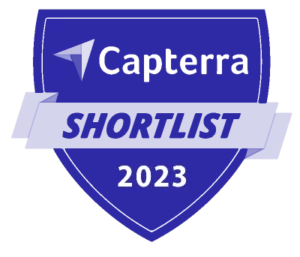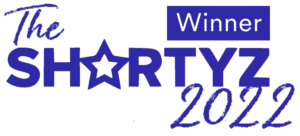Scaling involves growing your revenue and portfolio—but not your outgoings or teams. But it’s a huge challenge to expand if you have limited resources.
How can you scale without losing control, growing too fast, eating into your profits, or risking burnout?
With our tips and becoming a tech-enabled operation, that’s how.
In this piece, we explain:
- How to know when it’s the right time to scale your short-term rental business
- 9 tips to scale, including mindset change, automation, and finances
- The must-have tools you need to scale successfully—including a property management platform
When is the right time to scale your short-term rental business?
The right time to scale your short-term vacation rental management company (VRMC) is when it’s running smoothly. Your systems, processes, tech, staff management, and guest experience all need to be running well without any issues.
Trying to expand without getting this right first will only magnify any problems.
For example, if you’re struggling to respond to the guests you already have, adding more properties will only make that harder. And unanswered messages affect your reviews, bookings, and revenue.
Before scaling, streamline and optimize:
- Your tech setup with a property management system (PMS)
- Quality control, including great guest experiences and reviews
- Staff recruitment, coordination, and task management
- Your rates, revenue, and profit management
- Messaging, including automated responses to inquiries, questions, and review requests
Making sure your systems are solid, reliable, and repeatable will allow you to scale successfully.
9 tips to scale a vacation rental business
Scaling a vacation rental business successfully goes far beyond adding more properties to your portfolio.
As Henry Ford said, “If you do what you’ve always done, you’ll get what you’ve always got.” As you scale, look at each part of your business and ensure it’s prepared for your next move.
1. Mindset change
Scaling requires a mindset shift. It’s about understanding that you’re building something larger than yourself. And that you need to spend money to make money. Learning to delegate key tasks is also crucial.
This means setting up scalable, repeatable processes that anyone can follow. Also, long-term solutions that will continue to work as you grow.
For example, rather than a separate email address for guest communication, invest in tech to manage communication at scale.
Focusing on profitability and processes that others can execute without you is key.
2. Learn to delegate
As your portfolio grows, it becomes more difficult to manage everything yourself. And micromanaging is a recipe for burnout and mistakes—and a barrier to growth.
So you may need to hire a few staff to manage your properties.
Hire people you can train and trust and delegate the jobs you can’t do.
3. Think about tech
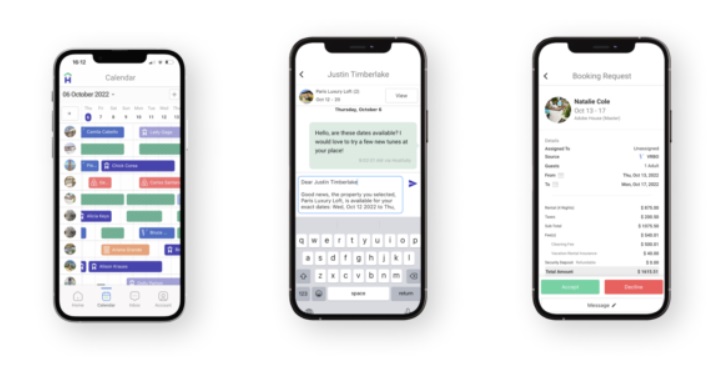
Source: Hostfully.com
Technology is your best friend when scaling.
This is because it lets you set up repeatable, scalable, and shareable processes, which you can change on the fly. You can also roll it out to more properties without increasing your investment. And, if you’re using property management software (PMS) with a wide range of integrations, you can perform multiple tasks from one central platform. For example, update a digital guidebook in a few clicks, instead of re-printing each one manually for each vacation rental property.
The most successful vacation rental managers are proactive about finding the best tech. There really is an app for everything.
4. Automate wherever possible
Vacation rental automation is the way forward for a scaling property management company.

Source: Hostfully.com
Connecting to a single PMS like Hostfully lets you automate repetitive tasks. This saves hours of time, even if your portfolio grows fast. You’re also less likely to forget important details and will stay competitive.
For example, you can use dynamic pricing tools to keep rates updated, automate review requests, and schedule cleaning—all without manual work or error.
No more being chained to your phone or laptop.
5. Enable direct bookings
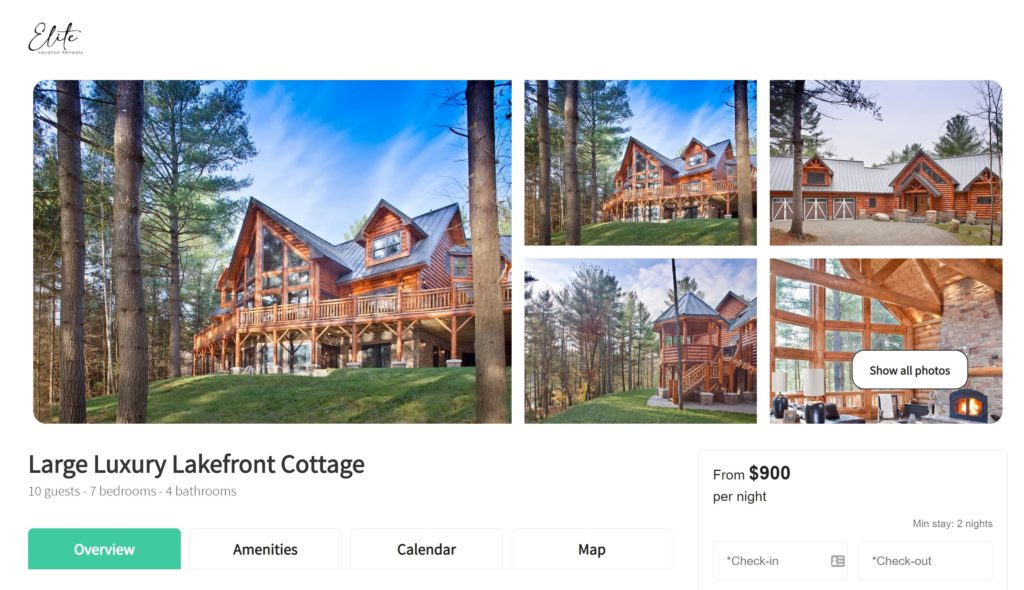
Source: Hostfully.com
A direct booking website lets you build a strong brand, improve your relationships with guests, and gather data for remarketing. It also increases your vacation rental earnings by sidestepping online travel agency (OTA) fees and enabling repeat bookings.
Many PMS or third-party providers offer direct booking website builders with booking engines and payment processing integrations.
6. Perfect your quality management
Offering excellent experiences to guests is always paramount.
As a smaller business, you’ve likely put a lot of effort into understanding what your guests want. You know what makes them happy (and what doesn’t), and what prompts them to leave five-star reviews. Perfect the guest experience before you scale, and continue to improve as you grow.
Enlist technology to respond quickly and offer helpful upsells, for example, through your digital guidebook. Ensure cleaning is always done on time and that check-in and check-out are smooth. Master the art of asking for reviews at the exact right time and encourage guests to mention your top amenities.
Great experiences lead to happy guests, repeat bookings, and word-of-mouth recommendations. This is a highly effective way to fill your calendar year after year.
7. Audit your finances
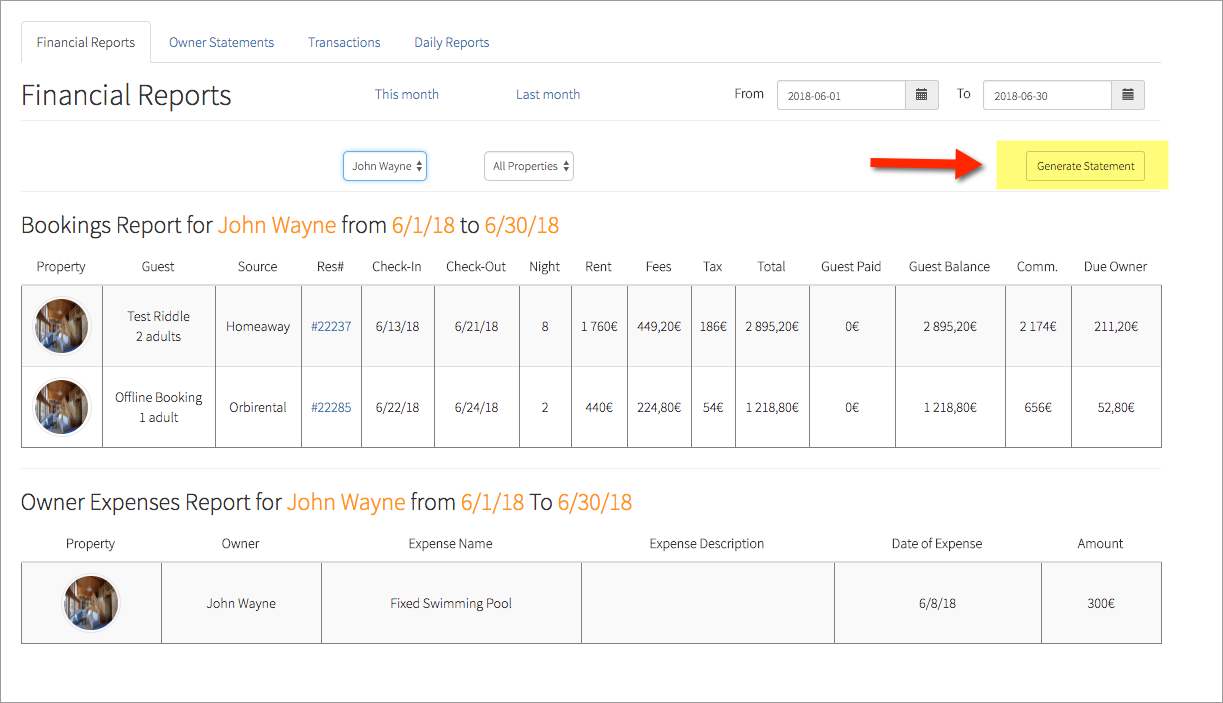
Source: Hostfully.com
Your existing business should be profitable, or potentially so, before you begin scaling. Any financial cracks in your operation will only widen to chasms as you scale.
Revenue is important, but profit is even more so. Your expenses may grow as you scale, and your revenue streams may diversify (bookings, events, upsells, etc). Outsourcing tasks to extra members of staff can also make understanding your accounts more complicated.
Using technology to perform many of your major financial tasks can simplify this. Yet, it’s still important to keep an eye on your finances as you scale to avoid losing money and grow sustainably.
It’s also imperative to have a strategic business plan if you want to secure investment as you scale.
8. Understand your unique selling proposition (USP)
As you become more established, you need to get clear on your unique selling proposition (USP). What sets you apart from the competition?
You don’t need to reinvent the wheel. There will always be competitors in your space. But understanding your ideal guest will help to hone your hospitality skills. So you can offer exactly what your guests want.
This is crucial to reach more would-be guests before they book. It ensures that your rentals are the go-to properties in your niche.
9. Walk before you run
At each stage of your growth, ensure everything is working perfectly before moving on.
Try not to make assumptions. For example, just because your properties are successful in one state, doesn’t mean they will work across the country.
Tackle scaling in stages to grow more sustainably.
13 tools to scale your property management business
Scaling your property management business successfully takes becoming a tech-enabled business.
Automation lets you delegate and outsource repetitive tasks without doubling your team. This increases productivity, without making your workload unmanageable or pushing your costs sky-high.
Let’s take a look at the tools that can help you scale successfully.
1. Property management platform
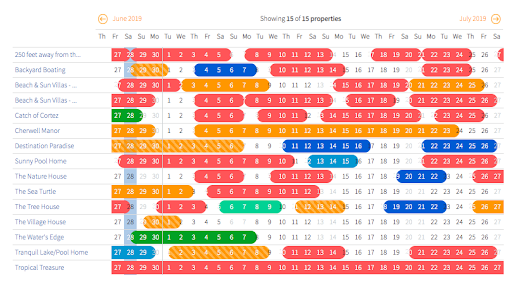
Source: Hostfully.com
Your PMS is the bedrock of your tech stack and the foundation of your scaling business.
In fact, Hostfully research found that 44% of rental hosts and managers said their PMS was the most valuable software in their business. This was far ahead of an OTA or listing site (12%).
Hostfully is a leading example of a PMS that enables you to connect and automate a vast range of tasks. Its features include channel distribution and automated messaging. It also has a centralized calendar that’s updated in real-time to avoid double bookings. Plus, payment processing, owner management, dynamic pricing, and reporting functionality.
Hostfully also specializes in Booking Pipeline management. This lets you see where your guests are in their booking journey, move leads along, and improve booking rates and guest satisfaction. There’s also a new mobile app, so you can manage guest communications and bookings on the go.
So with a single PMS, you can keep a close eye on finances and manage behind-the-scenes operations. You can also improve guest satisfaction and experiences to boost reviews and drive loyalty.
2. Dynamic pricing
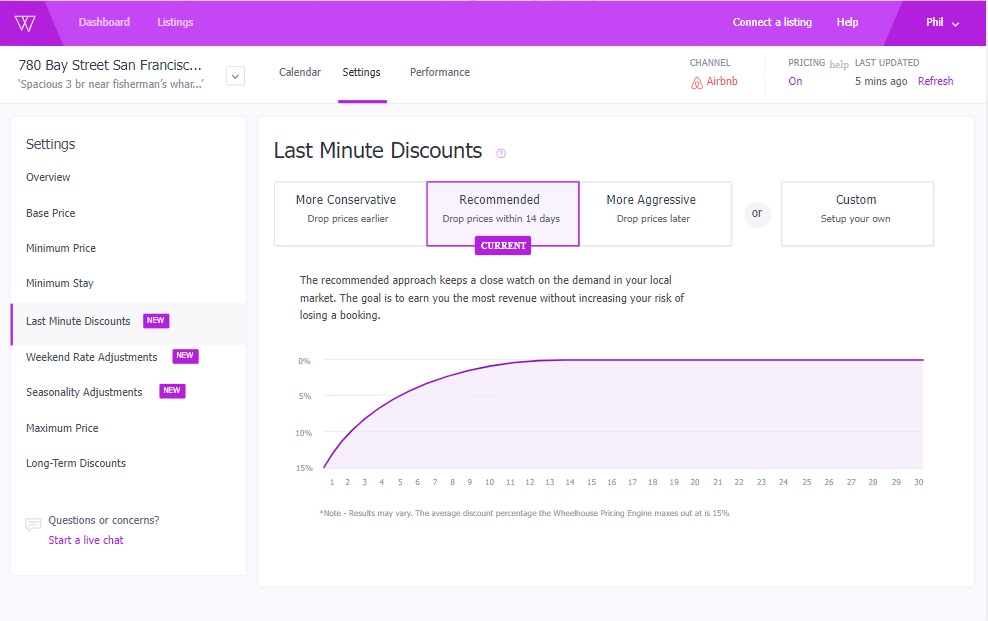
Source: UseWheelhouse.com
Dynamic pricing means your rates will always be as competitive as possible on all listings.
Dynamic pricing technology is a huge time saver compared to manually trying to track market demand. It uses hundreds of data points to optimize your vacation rental pricing strategy so you always get the best rates. Plus, you don’t have to hire a dedicated pricing expert to manage it.
These tools include Wheelhouse, PriceLabs, and Beyond—all of which integrate with Hostfully. They look at variables such as the short-term rental market rate, the season, and local events. They also consider competitor prices and changes in demand or supply to establish the most competitive rates.
Integrating a dynamic pricing tool into your PMS means you can sync rates across all of your listings. Hostfully even allows you to automatically add OTA fees, so you get paid the same no matter which platform your guests use.
3. Cleaning and turnover
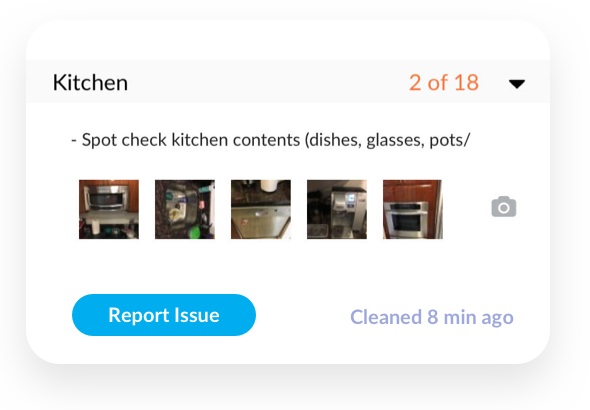
Source: Breezeway.io
Coordinating cleaning, turnovers, and maintenance manually is a major logistical nightmare. And the more properties you have, the more complex it can become.
Tech tools like Breezeway, EZcare, TurnoverBnB, Operto Teams, and Properly integrate with Hostfully to automatically schedule cleans and keep all your teams on the same page. They let you assign tasks and set up cleaning checklists for consistent standards. Many even let you make payments on the same platform.
Some of the platforms, like TurnoverBnB, even feature a marketplace to help you find cleaners at more competitive rates.
With tools like these, there’s no more risk of rentals remaining dirty when guests check-in. Plus, you can ensure all maintenance, repairs, and checks are being done exactly when needed. You can even keep track of cleaning materials and costs. So there’s never a shortage and supplies are factored into your budget.
4. Guest messaging and communication
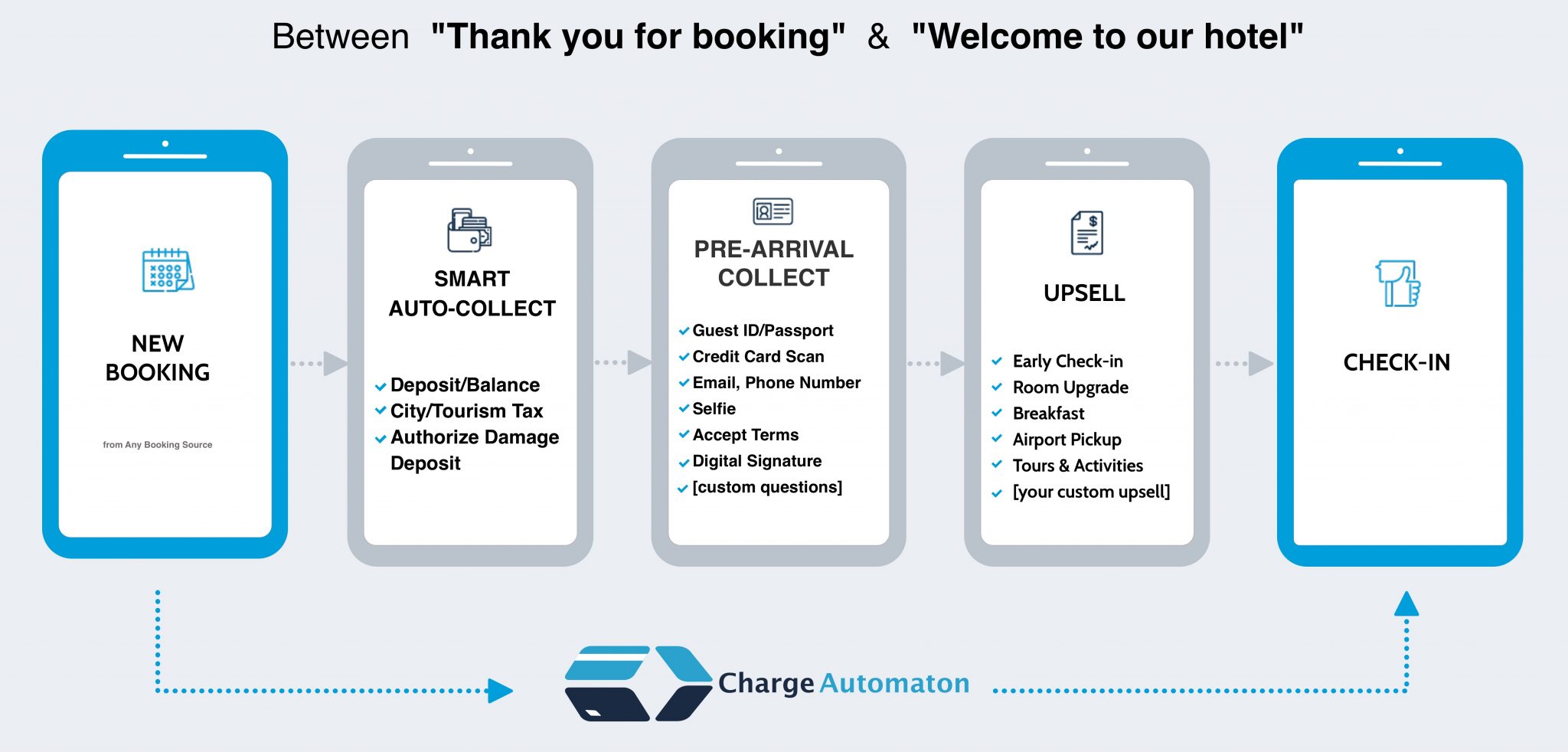
Source: Chargeautomation.com
Guest communication can make or break your short-term rental business.
Even before they book, would-be guests expect fast replies. They may move on to another host if their initial inquiries go unanswered. In contrast, prompt and helpful responses impress and help secure a booking.
You want to automate messages before, during, and after booking. This ensures that guests have all the information they need at the right time—and you never miss a message. Hostfully’s automated messaging system lets you do this with no manual work beyond the initial setup. It also collects guest data, ID, security deposits, and signatures and keeps all data stored securely too.
Leading tools like Charge Automation and Akia also integrate with PMSs like Hostfully. They invite guests to register and send you everything you need. This streamlines complex documentation and check-in processes and slashes time-consuming manual work for you.
5. Accounting
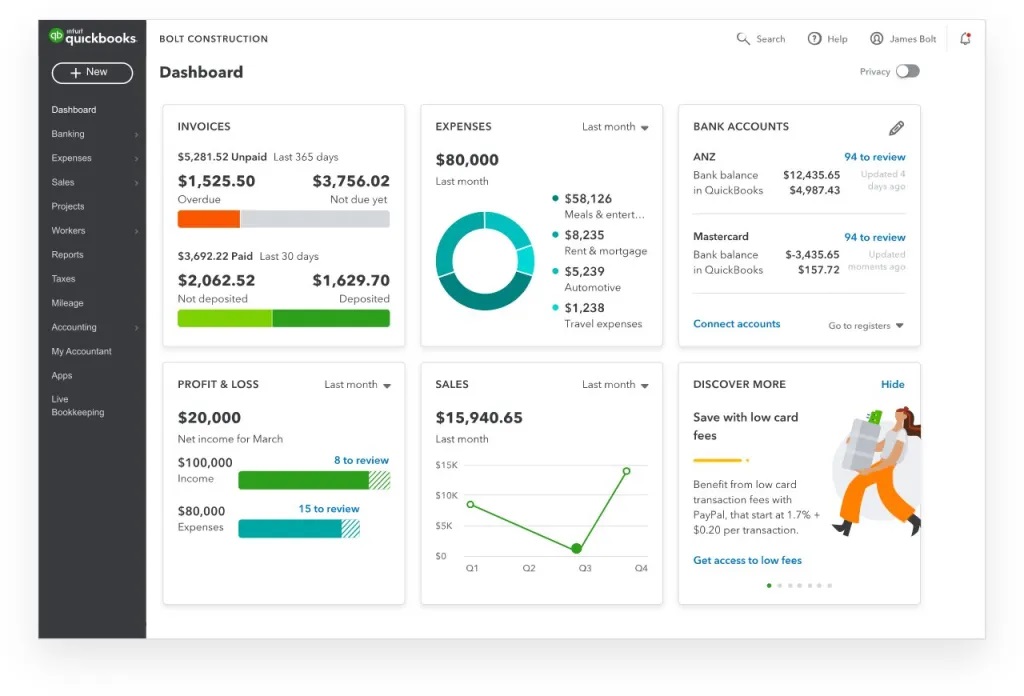
Source: Quickbooks.intuit.com
The more complex your business, the more crucial it is to keep your finances and vacation rental revenue management updated.
The days of keeping your books balanced using a single spreadsheet or pen and paper are over.
Powerful vacation rental accounting software lets you keep track of expenses and accounts. QuickBooks and Ximplifi (which integrate with Hostfully) enable you to pay bills, generate reports, and coordinate payroll.
6. Owner invoicing and management
As you scale, you want to show homeowners that you offer a good return on their investment. That means managing contract signing for new properties, payments, and reports.
Tools like Hellosign let you send contracts and invoices, and receive vacation rental owner signatures. And Hostfully’s Enhanced Reporting feature lets you adjust accounts based on your business model and reservation data. So you’re never left second-guessing when OTA payments are going to come in. You can also deduct fees against tax or split OTA fees between guests and owners.
All of which means you can take data-driven decisions instead of relying on guesswork—and keep your owners informed and happy.
7. Direct booking site
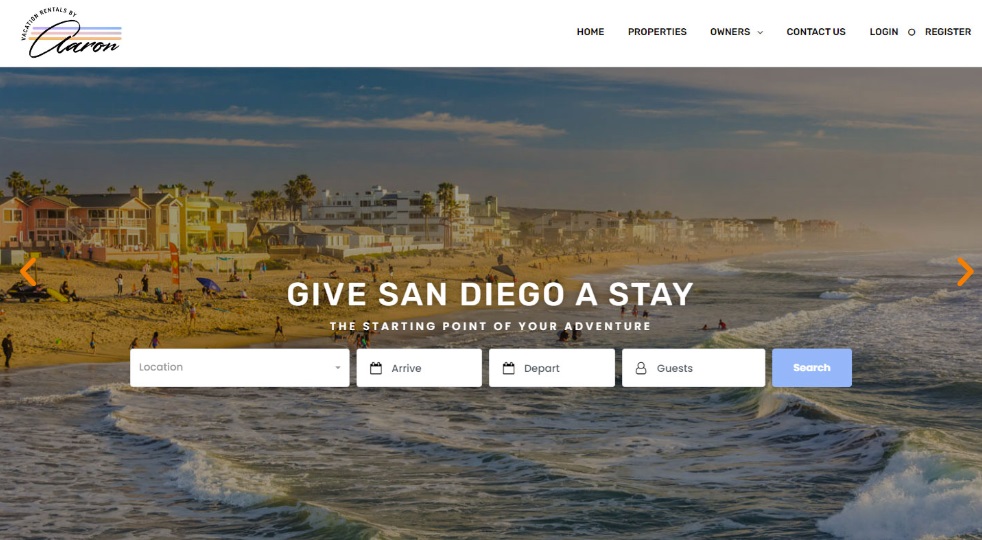
Source: Boostly.co.uk
Many PMSs offer a direct booking engine and website builder. Sites normally include an up-to-date availability calendar and online payments. The latter is usually managed via integrations with Stripe, Paypal, or Vacation Rent Payment.
Another option is to get a bespoke direct booking site from providers like Boostly or Hudson Creative Studio.
8. Digital guidebooks
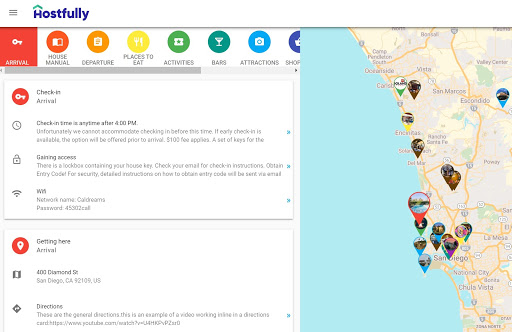
Source: Hostfully.com
Few short term rental features please guests and reduce repetitive questions like digital guidebooks. You can keep them updated easily and send them to guests in advance with minimal effort.
Hostfully PMS integrates seamlessly with the standalone Hostfully Digital Guidebooks platform. This enables you to build custom guidebooks with everything guests need to know about your property and destination. This could include how to work the coffee machine or ways to hire sports equipment. You can also include the WiFi password or a recommendation for your town’s best restaurant.
Best of all, they’re accessed via a browser-based link from guests’ phones. No annoying apps to download. You can also make unique QR codes for each section and display them in relevant parts of the property. For example, a code that links directly to the coffee machine manual in the kitchen. Guidebooks can also be translated into many languages for international guests.
9. Home automation
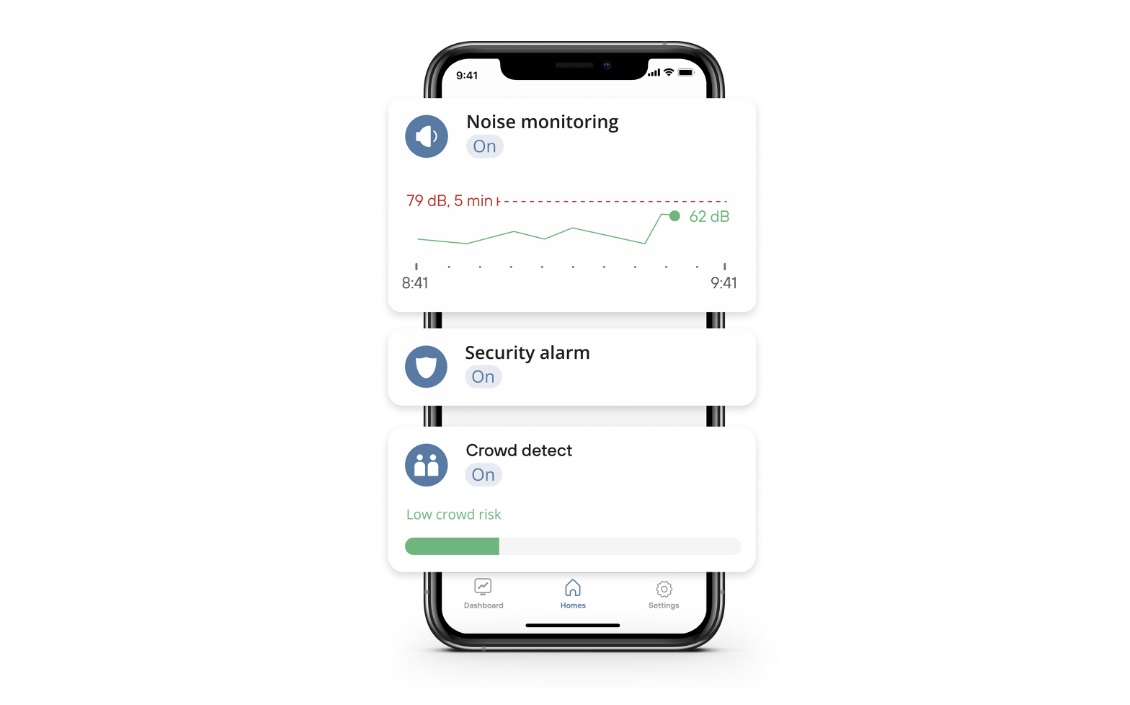
Source: Minut.com
Smart device automation is crucial for remote management of a scaling business.
The more properties you have, the less likely you are to be able to monitor each one (or even hire someone to do it for you). Enter smart devices and home automation platforms. These let you keep an eye on (and in) your properties without having to be physically present—or violating guest privacy.
Platforms like Lynx, NoiseAware, and Minut let you check noise and occupancy (and send alerts if they’re exceeded). They can also identify emergencies like water leaks, smoke, or CO2. All these integrate with Hostfully to ensure your guests and properties are safe.
Lynx and RemoteLock also let you harness the power of smart locks with temporary access codes that activate pre-stay and expire afterward. This means guests can check themselves in and out, saving you time and money. There’s no stress in case of delays and no lost or stolen keys. This improves security and makes check in much easier.
Other upsell platforms that integrate with Hostfully include OK2Charge. This lets you offer electric car charging as part of your service. There’s also Operto, which connects with smart thermostats and lights and manages guest communications. Finally, there’s PointCentral, for vacation rental-specialized alarms.
10. Insurance
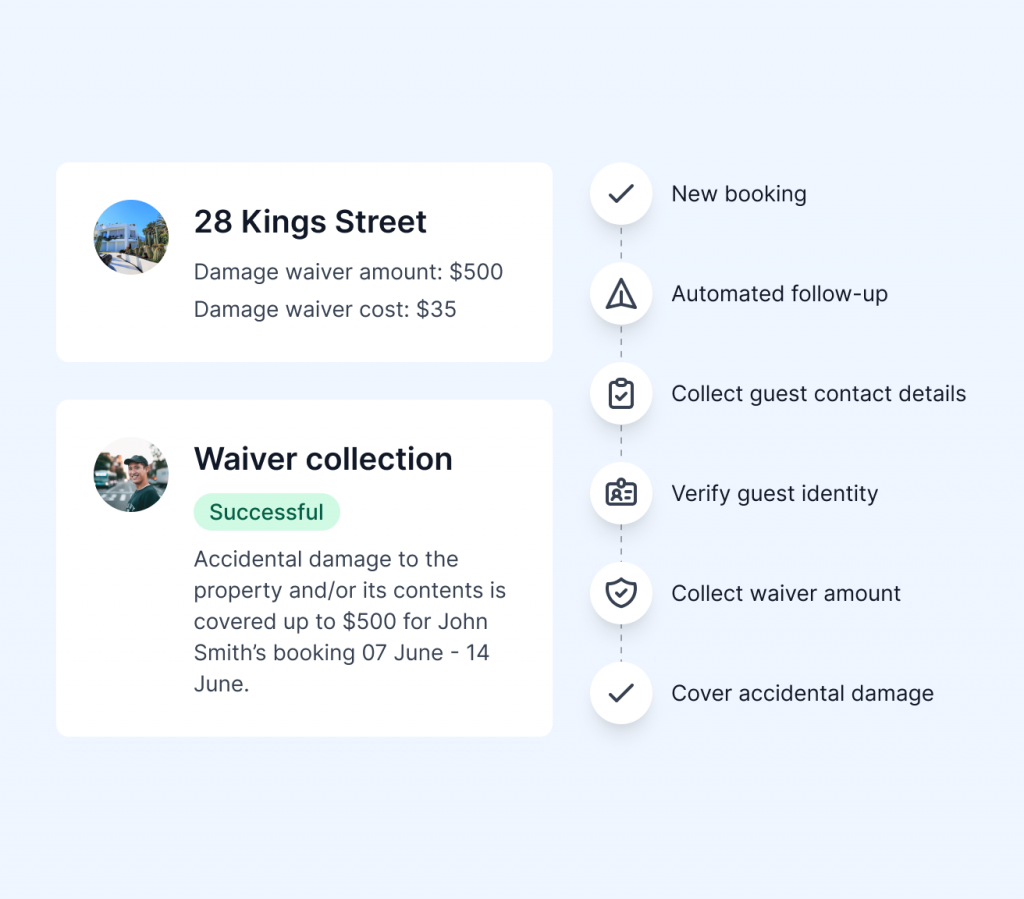
Source: truvi.com
More properties mean more risk. You must have adequate insurance to protect yourself, your properties, and guests.
Whether you opt for insurance or ask guests for security deposits, it’s easier when you use specialized platforms like Truvi, Autohost, or Safely. These check ID and past reviews, take deposits, and integrate with your centralized tech stack.
Using this technology means you can handle guest data safely and legally. You can also easily and quickly run checks on background, criminality, and previous rental reviews, which you could never do manually. This improves security, prevents damage, and offers greater peace of mind. It also presents a professional front to guests and deters would-be troublemakers.
11. Distribution and channel management
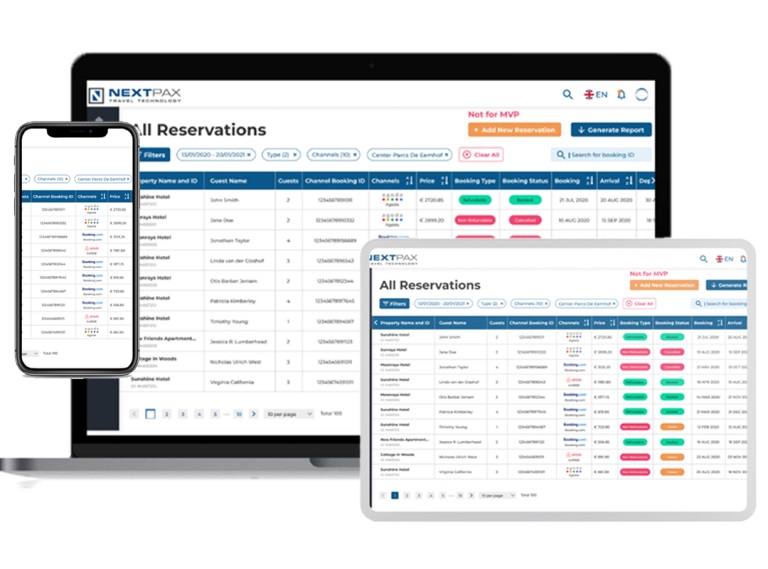
Source: NextPax.com
With more properties, you want to ensure that more people see your listings. This will help maintain occupancy rates and bookings and lets you spread the word more widely.
The best way to do this is to increase the number of channels you list on. You can update your pages one by one, but this is time-consuming. It’s also a recipe for disastrous double bookings, incorrect rates, and forgotten updates.
Instead, a PMS like Hostfully lets you edit listings simultaneously across leading platforms like Booking.com, Airbnb, and Vrbo. It also connects to smaller sites like Whimstay, Golightly, and Homes & Villas by Marriott International, which cater to different audiences.
Similarly, Hostfully connects to other specialized distribution managers like Rentals United and NextPax. This means you can list on even more niche sites for greater visibility and even more ideal guests.
The more places you list, the more people will see your properties and, hopefully, book.
12. Upsells and guest experience

Source: Nannybag.com
One way to stand out and generate more revenue from every stay is to offer additional amenities and services. These are designed to make stays even smoother and more enjoyable.
For example, Hostfully integrates with platforms that enable the hire of baby and child equipment, luggage storage, tours, ground transportation, digital concierge services, and more.
Connecting these tools with Hostfully lets you generate extra revenue—and get happier guests.
13. Marketing and review management
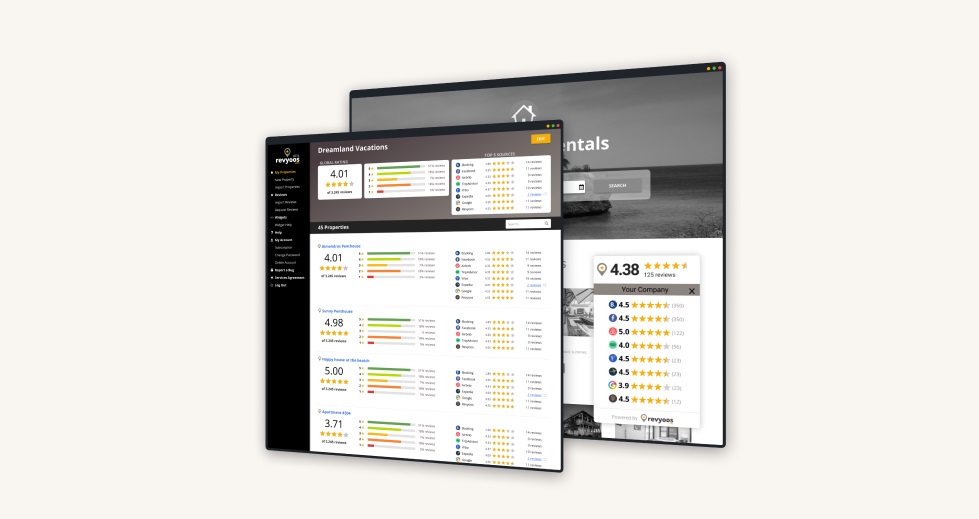
Source: Revyoos.com
Reviews improve guest trust, boost your ranking on internet searches, and improve conversion. The more good reviews you have, the more guests will trust you, and the more they will book.
But, once you’ve got good reviews from guests, what should you do once they come in? How can you ensure that all your reviews from various platforms show up in one place?
The answer: Revyoos.com, a leading tool that aggregates your reviews from across the web and enables you to display them on your website.
Other good marketing strategies include sending your guests a regular newsletter. You can also send discounts and other incentives to book. These could include coupons for their birthday or anniversary or special offers for holidays.
Gathering guest data (via direct bookings and guest ID checks) is crucial when building your list of potential future guests as it allows you to remarket to them and build loyalty.
Scaling your vacation rental business: leverage tech for success
Scaling your vacation rental business is about far more than adding more properties to your portfolio.
It’s about getting your business and mindset ready for growth and change. You also need to delegate, automate, and leverage technology to run a leaner, more effective and efficient operation.
Using a PMS like Hostfully lets you automate and centralize operations so you can do more with less. Via a wide range of third-party integrations, you can also boost profits through direct bookings, competitive rates, and monetizing additional amenities.
All of this means you’ll have more time to improve on your already great guest experiences—and attract new owners.
Frequently asked questions about scaling a short-term rental business
What are the most important tech tools to scale a vacation rental?
The most important tech tools to scale a vacation rental are those that help you to automate. This means starting with a property management platform like Hostfully that has a wide range of tool integrations.
Automation tools outsource, delegate, simplify, or otherwise manage crucial aspects of your business. This includes cleaning and turnover, dynamic pricing, and guest communication, among other tasks.
Is there a difference between automation and scaling?
Automation is when you use technology to make tasks in your business automatic. This means they happen on schedule or after certain triggers. For example, the day before a guest checks in, they are automatically sent a pre-written message with all the details they need.
Scaling is when you increase your business size without adding resources or staff (as far as possible).
Automation makes scaling easier. You can outsource repetitive but necessary tasks, so you increase the number of properties, but not your costs or workload.
What mistakes do people make when scaling a short-term rental business?
One of the biggest mistakes people make when scaling a short-term rental business is scaling before they are ready. If your business is still experiencing issues, then increasing its size will only magnify the problems. Instead, you want to ensure that your business is already optimized and running well before scaling.
What are some of the challenges of scaling a short-term rental business?
Some of the challenges of scaling a short-term rental business include knowing if you’re ready to scale. You’ll also want to increase portfolio size without adding hours to your workload, magnifying problems, or having to hire many more people.
Expand your portfolio while increasing your productivity. You want to operate efficiently without eating into your profit. This means automating and delegating wherever possible.






